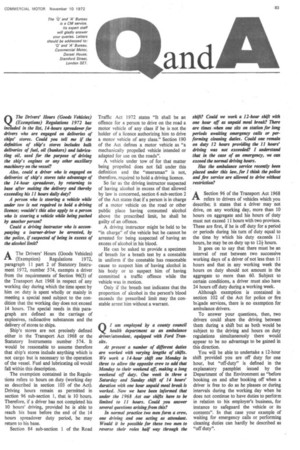4:14? The Drivers' Hours (Goods Vehicles) (Exemptions) Regulations 1972 has in
Page 81

If you've noticed an error in this article please click here to report it so we can fix it.
c tided in the list, 14-hours spreadover for drivers who are engaged on deliveries of ships' stores. Could you tell me if the definition of ship's stores includes bulk deliveries of fuel, oil (hunkers) and lubricating oil, used for the purpose of driving the ship's engines or any other auxiliary machinery on the vessel?
Also, could a driver who is engaged on deliveries of ship's stores take advantage of the 14-hour spreadover, by returning to base after making the delivery and thereby exceeding his 11 hours daily duty?
A person who is steering a vehick while under tow is not required to hold a driving licence; wouldn't this also apply to a person who is steering a vehicle while being pushed by another person?
Could a driving instructor who is accompanying a learner-driver be arrested, by the police, if suspected of being in excess of the akohol limit?
AThe Drivers' Hours (Goods Vehicles) (Exemption) Regulations 1972, paragraph 11 part 2 of Statutory Instrument 1972, number 574, exempts a driver from the requirements of Section 96(3) of the Transport Act 1968 in respect of any working day during which the time spent by him on duty is spent wholly or mainly in meeting a special need subject to the condition that the working day does not exceed 14 hours. The special needs in this paragraph are defined as the carriage of explosives, radioactive substances and the delivery of stores to ships.
Ship's stores are not precisely defined either in the Transport Act 1968 or the Statutory Instruments number 574. It would be reasonable to assume therefore that ship's stores include anything which is not cargo but is necessary to the operation of the vessel. Fuel and lubricating oil would fall within this description.
The exemption contained in the Regulations refers to hours on duty (working day as described in section 103 of the Act). Driving hours remain as permitted in section 96 sub-section 1, that is 10 hours. Therefore, if a driver has not completed his 10 hours' driving, provided he is able to reach his base before the end of the 14 hours spreadover duty period, he may return to his base.
Section 84 sub-section 1 of the Road Traffic Act 1972 states "It shall be an offence for a person to drive on the road a motor vehicle of any class if he is not the holder of a licence authorizing him to drive a motor vehicle of any class." Section 190 of the Act defines a motor vehicle as "a mechanically propelled vehicle intended or adapted for use on the roads".
A vehicle under tow of for that matter being propelled does not fall under this definition and the "steersman" is not, therefore, required to hold a driving licence.
So far as the driving instructor suspected of having alcohol in excess of that allowed by law is concerned, section 6 sub-section 2 of the Act states that if a person is in charge of a motor vehicle on the road or other public place having consumed alcohol above the prescribed limit, he shall be guilty of an offence.
A driving instructor might be held to be "in charge" of the vehicle but he cannot be arrested for being suspected of having an excess of alcohol in his blood.
He can be asked to provide a specimen of breath for a breath test by a constable in uniform if the constable has reasonable cause to suspect him of having alcohol in his body or to suspect him of having committed a traffic offence while the vehicle was in motion.
Only if the breath test indicates that the proportion of alcohol in the person's blood exceeds the prescribed limit may the constable arrest him without a warrant.




































































































































